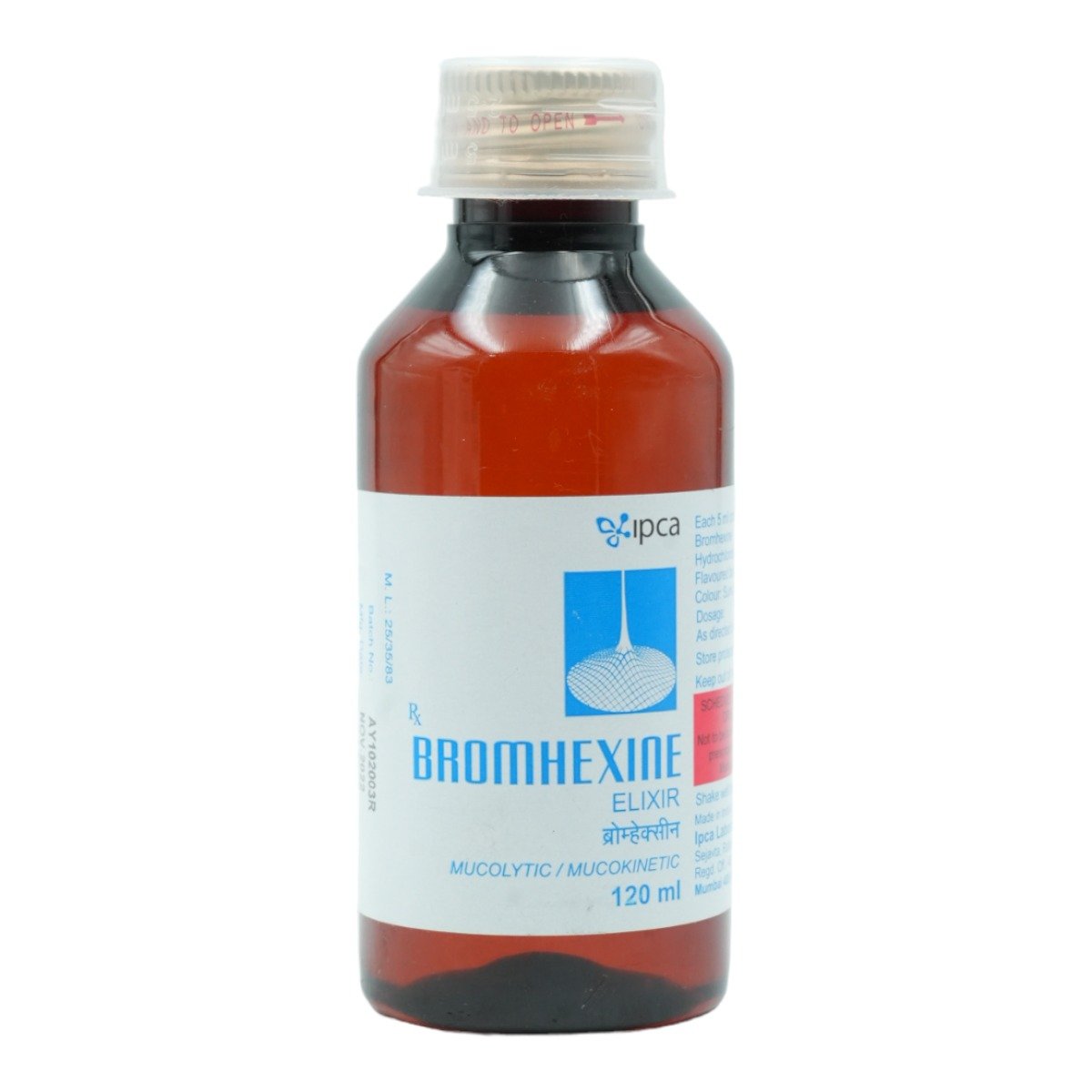Bromohexine Elixir

MRP ₹67.9
(Inclusive of all Taxes)
₹10.2 Cashback (15%)
know your delivery time
Provide Delivery Location
Composition :
Manufacturer/Marketer :
Consume Type :
Expires on or after :
Return Policy :
Selected Pack Size:100 ml
100 ml ₹61.11
(₹0.61 per ml)
Out of stock
120 ml ₹132.3
(₹1.1 per ml)
In Stock

Secure Payment

Trusted by 8 Crore Indians

Genuine Products
Therapeutic Class
Country of origin
Manufacturer/Marketer address
Author Details
We provide you with authentic, trustworthy and relevant information
Disclaimer
Alcohol
Safe if prescribed
Avoid consumption of alcohol with Bromohexine Elixir as it may increase drowsiness. Please consult a doctor before consuming alcohol with Bromohexine Elixir .
Pregnancy
Consult your doctor
The safety of Bromohexine Elixir in pregnant women is unknown. Therefore, it is given to pregnant women only if the doctor thinks the benefits outweigh the risks.
Breast Feeding
Consult your doctor
It is unknown whether Bromohexine Elixir is excreted in human milk. Bromohexine Elixir is given to breastfeeding mothers only if the doctor thinks benefits are more significant than risks.
Driving
Safe if prescribed
Bromohexine Elixir may cause dizziness or drowsiness in some people. Therefore, drive only if you are alert after taking Bromohexine Elixir .
Liver
Consult your doctor
Take Bromohexine Elixir with caution, especially if you have a history of Liver diseases/conditions. The dose may be adjusted by your doctor as required.
Kidney
Consult your doctor
Take Bromohexine Elixir with caution, especially if you have a history of Kidney diseases/conditions. The dose may be adjusted by your doctor as required.
Children
Safe if prescribed
Bromohexine Elixir should be used with caution in children if prescribed by a doctor. The dose may be adjusted by your doctor as required.
Product Substitutes
About Bromohexine Elixir
Bromohexine Elixir belongs to the class of medicines called 'expectorants' primarily used to treat cough associated with mucus. Coughing (dry or productive) is the body's way of clearing irritants (like allergens, mucus, or smoke) from airways and preventing infection. There are two types of coughs, namely: Dry cough and chesty cough. A dry cough is tickly and doesn't produce any vicious or thick mucus, while a chesty cough (wet cough) means mucous or sputum is produced to help clear your airways.
The Bromohexine Elixir contains bromhexine. It enhances mucus transport by reducing mucus viscosity and activating the ciliated epithelium (mucociliary clearance). This secretolytic and secretomotor effect in the bronchial tract area relieves cough and facilitates expectoration.
Your doctor will recommend how often you take Bromohexine Elixir based on your medical condition. Some people may experience nausea, vomiting, drowsiness, headache, dizziness, skin rash, stomach upset, and diarrhoea. Most of these side effects of Bromohexine Elixir do not require medical attention and gradually resolve over time. However, if the side effects persist or worsen, please consult your doctor.
Please tell your doctor if you are allergic to Bromohexine Elixir or any other medicines. If you are pregnant or breastfeeding, it is advised to inform your doctor before using Bromohexine Elixir . Bromohexine Elixir should be used with caution in children below six years. Drink plenty of fluids while taking Bromohexine Elixir to loosen mucus. If you have stomach ulcers, asthma, phenylketonuria (a congenital disability that causes accumulation of amino acid, phenylalanine in the body), or kidney or liver problems, inform your doctor before taking Bromohexine Elixir .
Uses of Bromohexine Elixir
Medicinal Benefits Mweb
Key Benefits
Bromohexine Elixir contains Bromhexine. Bromhexine is used in a condition where there is a lot of thick mucus in the airways. It enhances mucus transport by reducing mucus viscosity and by activating the ciliated epithelium (mucociliary clearance). This secretolytic and secretomotor effect in the bronchial tract area relieves cough and facilitates expectoration.
Directions for Use
Side Effects of Bromohexine Elixir
- Nausea
- Vomiting
- Diarrhoea
- Upper abdominal pain
- Sweating
- Angioedema
- Urticaria
- Bronchospasm
- Headache
- Dizziness
- Rash
- Pruritus
Drug Warnings
Do not take Bromohexine Elixir if you are allergic to any components present in Bromohexine Elixir . If you are pregnant or breastfeeding, it is advised to inform your doctor before using the Bromohexine Elixir . Bromohexine Elixir should be used with caution in children below six years. Drink plenty of fluids while taking Bromohexine Elixir to loosen mucus. If you have stomach ulcers, asthma, phenylketonuria (a congenital disability that causes accumulation of amino acid, phenylalanine in the body), or kidney or liver problems, inform your doctor before taking the Bromohexine Elixir .
Drug-Drug Interactions
Drug-Drug Interactions
Login/Sign Up
Drug-Food Interactions
Drug-Food Interactions
Login/Sign Up
Drug-Diseases Interactions
Drug-Diseases Interactions
Login/Sign Up
Drug-Drug Interactions Checker List
- ERYTHROMYCIN
- CEFALEXIN
- OXYPHENBUTAZONE
- PHENYLBUTAZONE
- AMPICILLIN
- AMOXICILLIN
- OXYTETRACYCLINE
Habit Forming
Special Advise
- You are recommended to inform your doctor that you are taking Bromohexine Elixir before undergoing any medical tests or surgery.
- It is advised to stop using Bromohexine Elixir if your cough persists for more than one week and consult your doctor.
- Do not take Bromohexine Elixir if you have taken an MAO inhibitor (anti-depressant medication) in the past 14 days, it may cause serious drug interaction.
Diet & Lifestyle Advise
- Avoid dairy products such as milk as they may increase mucus production. Also, avoid processed or refined foods to have relief from cough. Instead, replace baked foods, fried foods, white bread, white pasta, French fries, sugary desserts, and chips with green leafy vegetables.
- Drink plenty of fluids to avoid dry throat while you have a cough and loosen mucus.
- Avoid citrus fruits as they may worsen the cough.
- Eat fruits rich in water content such as pears, watermelon, peaches, and pineapples.
- Eat a healthy diet and exercise regularly to strengthen your breathing muscles and boost your immune system.
- Learning breathing exercises will help you move more air in and out of your lungs.
- Quit smoking and avoid passive smoking. Smoking also reduces the effectiveness of the medicine.
All Substitutes & Brand Comparisons
RX
Bromhexine Elixir 120 ml
Ipca Laboratories Ltd
₹147
(₹1.1/ 1ml)
80% COSTLIER

Have a query?
Buy best Respiratory System products by
Cipla Ltd
Lupin Ltd
Glenmark Pharmaceuticals Ltd
Sun Pharmaceutical Industries Ltd
Alkem Laboratories Ltd
Macleods Pharmaceuticals Ltd
Mankind Pharma Pvt Ltd
Zydus Healthcare Ltd
Leeford Healthcare Ltd
Dr Reddy's Laboratories Ltd
Zydus Cadila
Abbott India Ltd
Intas Pharmaceuticals Ltd
Alembic Pharmaceuticals Ltd
German Remedies Ltd
Centaur Pharmaceuticals Pvt Ltd
Ipca Laboratories Ltd
Aristo Pharmaceuticals Pvt Ltd
Pristine Pearl Pharma Pvt Ltd
Wockhardt Ltd
GlaxoSmithKline Pharmaceuticals Ltd
Zuventus Healthcare Ltd
Koye Pharmaceuticals Pvt Ltd
Micro Labs Ltd
Blue Cross Laboratories Pvt Ltd
Medishri Healthcare Pvt Ltd
Med Manor Organics Pvt Ltd
Indiabulls Pharmaceuticals Pvt Ltd
Adonis Laboratories Pvt Ltd
FDC Ltd
Fourrts India Laboratories Pvt Ltd
Tablets India Ltd
J B Chemicals & Pharmaceuticals Ltd
Shreya Life Sciences Pvt Ltd
Divine Savior Pvt Ltd
Indoco Remedies Ltd
Seagull Pharmaceutical Pvt Ltd
Yash Pharma Laboratories Pvt Ltd
Torque Pharmaceuticals Pvt Ltd
Uniza Healthcare Llp
Wings Pharmacuticals Pvt Ltd
Biological E Ltd
Corona Remedies Pvt Ltd
Icarus Health Care Pvt Ltd
Steris Healthcare
Apex Laboratories Pvt Ltd
Geno Pharmaceuticals Pvt Ltd
Navil Laboratories Pvt Ltd
Precept Pharma
Aar Ess Remedies Pvt Ltd
La Renon Healthcare Pvt Ltd
Torrent Pharmaceuticals Ltd
Astra Zeneca Pharma India Ltd
Biochem Pharmaceutical Industries Ltd
Comed Chemicals Ltd
Entod Pharmaceuticals Ltd
Franco Indian Pharmaceuticals Pvt Ltd
Healthgate Pvt Ltd
Intra Life Pvt Ltd
Megma Healthcare Pvt Ltd
Pfizer Ltd
RPG Life Sciences Ltd
Unipark Biotech Pvt Ltd
Votary Laboratories (India) Ltd
Wanbury Ltd
Brinton Pharmaceuticals Ltd
Dolvis Bio Pharma Pvt Ltd
Eisen Pharmaceutical Co Pvt Ltd
Group Pharmaceuticals Ltd
Knoll Pharmaceuticals Ltd
Morepen Laboratories Ltd
Panacea Biotec Ltd
Prevego Healthcare & Research Pvt Ltd
Rnd Laboratories Pvt Ltd
Sanatra Healthcare Ltd
Skn Organics Pvt Ltd
Stedman Pharmaceuticals Pvt Ltd
Thuyam Life Pvt Ltd
Timon Pharmaceuticals Pvt Ltd
Aglowmed Pharmaceuticals Ltd
Ajanta Pharma Ltd
Alniche Life Sciences Pvt Ltd
Bio Warriors Pharmaceucticals Pvt Ltd
Biochemix Health Care Pvt Ltd
Cadila Healthcare Ltd
Cadila Pharmaceuticals Ltd
Caplet India Pvt Ltd
Chemo Healthcare Pvt Ltd
Delcure Life Sciences Ltd
East West Pharma India Pvt Ltd
Elder Pharmaceuticals Ltd
Embiotic Laboratories (P) Ltd
Emcee Pharmaceuticals (P) Ltd
Foregen Healthcare Ltd
Hetero Healthcare Pvt Ltd
Incite Pharmaceuticals
Iva Healthcare Pvt Ltd
Kepler Healthcare Pvt Ltd
Kristal Pharmaceuticals
Lincoln Pharmaceuticals Ltd




